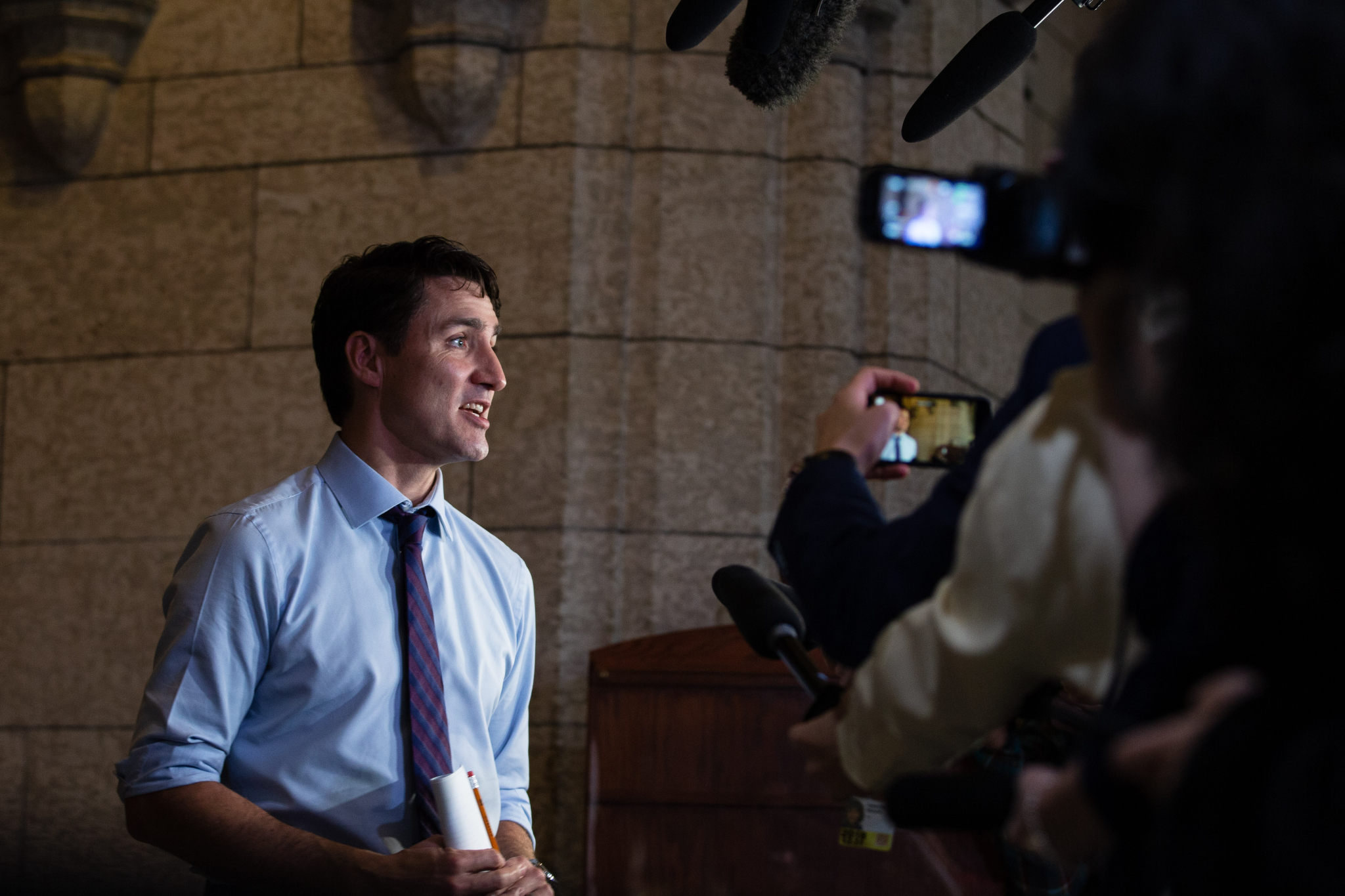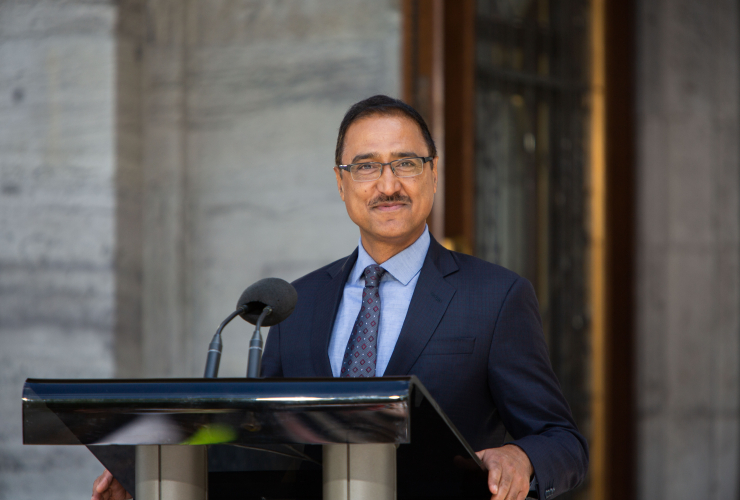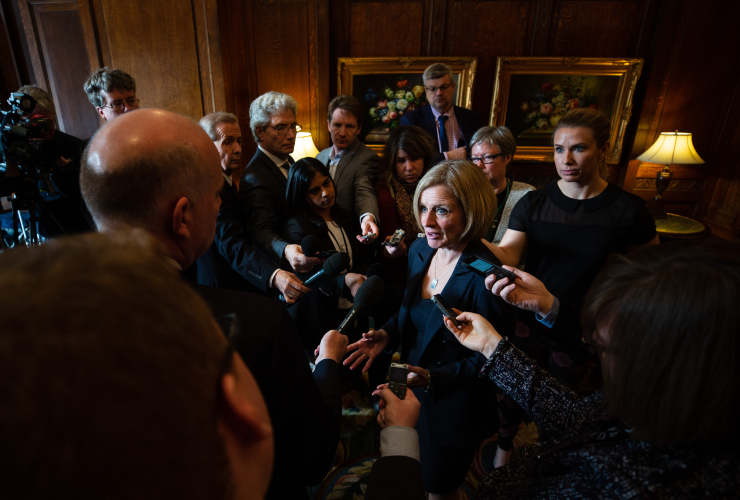The Trudeau government is set to announce details Thursday of its plan to regulate one of the largest sources of carbon pollution — the transportation sector.
The new draft framework would be introduced as part of a long-awaited clean fuel standard, promised by Prime Minister Justin Trudeau's Liberals in 2016, about one year after it formed a government.
The policy is expected to build on standards previously introduced in other jurisdictions, including British Columbia, California and Europe, that directly target the environmental footprint of fuels produced by industry that are used for transportation.
The federal government has said that the clean fuel standard is "one of the largest emissions-reduction policies” in its overall climate strategy, the Pan-Canadian Framework.
As of 2016, pollution from transportation was responsible for 25 per cent of Canada's overall greenhouse emissions, slightly behind the oil and gas sector, which was responsible for 26 per cent of emissions.
The proposed clean fuel standard would be one of several actions related to Prime Minister Justin Trudeau’s carbon pollution reduction efforts that will be rolled out Thursday, according to four sources close to government.
There will also be a new analysis of Canada’s emissions trends, which is expected to confirm that the Ford government's new pollution reduction target in Ontario will result in 30 megatonnes more pollution in 2030.
The premiers themselves are expected to sign on to a new statement supporting Trudeau's climate plan, with a caveat related to carbon pricing.
Finally, Environment and Climate Change Canada will be unveiling new details about Canada's proposed system to price large polluters based on the intensity of emissions, called the output-based pricing system.
The government would still need to hold a period of consultations on its draft proposals for clean fuel regulations, before Trudeau's cabinet approves them.
The initial details to be announced on Thursday come at a critical time for the Trudeau government, which is being criticized on all sides for its environmental policies.
Some see the government as not doing enough to fight climate change. The global scientific consensus is that roughly half of the planet's carbon pollution will need to be cut over the next 12 years to avoid more dangerous and destructive floods, droughts and poverty levels. Yet Canada's targets are insufficient to achieve this, and the UN has said Canada won't hit its current targets.
The government's decision to spend billions of public dollars purchasing the Trans Mountain pipeline system, and its other financial support for the oilpatch has made decarbonization of the Canadian economy appear more out of reach.
Meanwhile, the government's moves to impose a price on pollution, overhaul the federal environmental assessment regime, ban oil tankers from the northern B.C. coast, regulate and restrict methane emissions and other decisions have led to criticism from the energy sector that Trudeau is throwing too much at them all at once, particularly given the low price of oil. There have been an explosion of pro-oil protests recently.
The announcement could also raise the temperature on recent debates between Trudeau's Liberals and Opposition Leader Andrew Scheer's Conservatives. The governing Liberals have accused the Conservatives of having no plan to fight climate change, while the Tories have suggested that Trudeau's plan would raise the cost of living, without having a significant impact on greenhouse gas emissions.
Trudeau's Pan-Canadian Framework relies on several complementary actions to cut carbon emissions. There is a price on pollution, which is being deployed in different ways, but there is also the clean fuel standard, as well as tightening energy efficiency standards.
Thursday's announcement will help cover some gaps that Trudeau and Environment and Climate Change Minister Catherine McKenna have so far left unfilled.
For example, when Trudeau demonstrated in October how the federal carbon pricing system will include a system of rebates to compensate Canadians for the extra charges when they purchase fossil fuels, the parallel plan that imposes an emissions trading system on large industries was not discussed in detail. The government said it would release a paper on the draft output-based pricing system regulations this fall.
The output-based system is intended to compensate for trade-exposed industrial facilities by creating a system where they only pay a carbon price if they are above a benchmark level of performance in their sector. A major question is whether — and how quickly — those benchmarks will come down over time, so that pollution is being cut industry-wide.
One source expected the clean fuel standard draft paper to cover how much obligation will fall on liquid fuels and may cover other types of fuels as well.
One unanswered question related to the fuel standard is how the government will avoid double-counting credits. For example, if less coal is being used, as a result of the government’s 2030 coal-power phase-out, will that count as a clean-fuel standard win, or a coal phase-out win?
Another question is how Canada will account for biofuels, specifically concerns over whether it is omitting a major source of pollution from its calculations — the carbon footprint of the worldwide expansion of biofuels crops, known as indirect land-use change.
Sources say Canada will present three different scenarios for an update on its emissions trends, accounting for different pathways related to how much carbon pollution can be cut in Canada over the next several years. The different scenarios would likely demonstrate the impact of provincial decisions on Canada's overall pollution.
Ontario, for example, abandoned its price on pollution after the Ford government took office, and has launched legal action against the federal carbon price.
Oh goody, goody. Some more
Oh goody, goody. Some more meaningless gestures to celebrate.
This government has proven to
This government has proven to be quite transparent. We can see right through them. It's Christmas time everyone....from now until election day for our generous Liberals. Unfortunately future generations will still be paying for Santa's generosity.
How much will this new
How much will this new bureaucracy to take our money...then give back cost taxpayers? My call on this Trudeau directed policy? Total insanity. It smells bad and if we hold on to this party for another term we'll come to retch over what we have done.
I've heard that building new
I've heard that building new oil pipelines is essential to any effective climate plan.
Buying pipelines outright is even better.
Albertans are doing their part by taking part in monster truck rallies.
Vroom, vroom.
it is indeed a hard sell for
it is indeed a hard sell for the Liberals with all the contradictions of policy here. Fighting climate change and promoting pipelines that carry dilbit can't go together in my mind. Cognitive dissonance I think it's called. And the noise coming from Alberta (we're angry, don't you know) doesn't make sense. Big trucks jamming Alberta highways demonstrate what exactly? The temptation to go on here and be sarcastic is great but it won't get us anywhere. So, what are we Canadians doing to ourselves?
Cognitive dissonance is a
Cognitive dissonance is a good partial diagnosis. Existential fear, is another piece of the puzzle. Human brains appear not to have evolved enough to deal rationally with the complexity of disentangling global destructive forces so totally integrated into our various systems of human civilization. All those who spew out their frustrations and fears on governments, political parties, and activists of varied stripes are like the fabled lemmings - committing the "full bore, linear panic, stampede". Hurling insults at those charged with navigating necessary change is the reaction of numbskulls. Try something constructive instead?
I honestly don't know why
I honestly don't know why people think this country can either just walk away from oil or continue to use it unabated. It's imperative that we transition to a better form of energy. The current government policy and actions seem to me to be going in that direction.
Going from Trudeau's pre
Going from Trudeau's pre-election rhetoric, "We will wean Canada off of fossil fuels to post election Trudeau rhetoric, "We can't leave in in the ground" is the right direction? ,,,with Trudeau encouraging ever more exploration, marketing and sales? You've lost me. He truly does speak from both sides of his mouth. A visionary? No.
VERY IMPORTANT !
VERY IMPORTANT !
"Another question is how Canada will account for biofuels, specifically concerns over whether it is omitting a major source of pollution from its calculations — the carbon footprint of the worldwide expansion of biofuels crops, known as indirect land-use change."






Comments